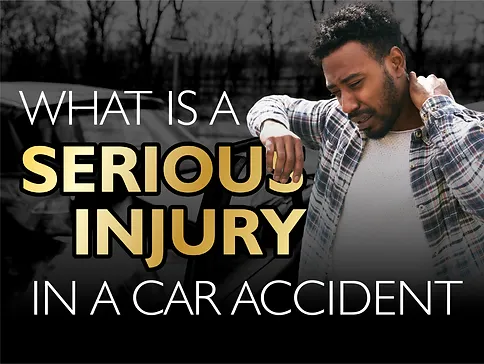When you are in a car accident, you have the chance of sustaining serious damages from an injury. Either way, treatment, and proper evaluation are necessary. The reasoning for this is adrenaline rushes through the body, preventing any sensation of pain for a few days, sometimes even weeks after an accident.
Accident injuries are serious and detrimental to one’s overall health if not properly cared for or managed. Our accident attorneys have provided some of the most common serious injuries that happen as the result of an accident and provided some options if you have suffered such injuries.
Things you should know about serious injuries from a car accident
What is defined as a serious injury, medically speaking?
For something to be considered a serious injury after an accident, a medical professional has to deem it so. These types of injuries are generally those which happen in the spine or brain. Due to the fact that these injuries have life-altering effects, they are considered serious.
Examples of serious spinal injuries as a result of a car accident
Spinal injuries affect mobility, as many of the body’s major nerves are connected through it. If you break or fracture your spine, those nerves are affected and can sometimes result in paralysis if severely damaged. In some cases, paralysis does not occur, such as in the case of a herniated disc, but the individual does experience intense amounts of pain.
Some of these injuries include, but are not limited to:
Whiplash: an injury that affects the soft tissues in the neck, causing damage to the tendons.
Herniated discs: when one of the rubbery discs between the vertebrae in the spine is displaced or ruptured, causing the soft material in the middle to protrude and potentially compress nerves or the spinal cord.
Spinal fractures: cause one or more vertebrae to crack and result in severe pain.
Spondylolisthesis: a condition in which one or more vertebrae slip out of place and push against the bone below, often affecting the lower back.
Spinal stenosis: the narrowing of spaces within the spine, which can lead to pressure on the spinal cord and cause symptoms such as numbness, weakness, and pain.
Examples of serious brain-related injuries as a result of a car accident
As most know, the brain is in charge of a lot of functions within our bodies, whether it’s emotional or basic cognitive functions. These injuries can result in severely bad mental health conditions, the inability to form or remember certain memories, and the inability to perform basic daily functions.
Some of these injuries include:
Concussions: a form of a mild traumatic brain injury that can still have serious health consequences and cause extreme pain.
Brain contusions: a bruise that occurs on the brain and often is a result of a blow to the head or a violent jolt. While many contusions will heal on their own, they can lead to more serious outcomes, such as blood clots and bleeding on the brain.
Skull fractures: This type of injury often accompanies other brain injuries such as contusions and concussions and can result in symptoms such as bleeding from the ears or nose, bruising on the head, and swelling at the site of impact.
Acquired brain injury: also known as a secondary brain injury, can occur without any direct impact on the head. This type of injury occurs as a result of a problem inside the body, such as an injury that restricts oxygen flow to the brain. Without oxygen, brain cells can die, and results in reduced brain function.
Coup-contrecoup brain injuries: occur when the brain is injured in two places, often as a result of a hard blow to the head. The brain is injured at the location of the blow, but it can also be injured when the force of the blow causes the other side of the brain to hit the inside of the skull.
Brain penetration: when an object breaks through the skull and enters the brain. This type of injury is often deadly, and survivors may experience debilitating effects for the rest of their lives.
There are many ways in which the spine and brain can be affected during a car accident. Depending on the way the impact hits, your body gets thrown around in a certain way which can result in hitting hard objects. That is why it is important to seek medical attention after a car accident.
What is defined as a serious injury by law?
On a legal level, certain qualifications make something a serious injury. There is a “threshold” that is defined by the Florida statute for something to be deemed a serious injury.
These qualifications are as follows:
Significant and permanent loss of an important bodily function
Permanent injuries
Significant and permanent scarring or disfigurement
Death
A reasonable degree of medical probability of death
If you meet the criteria within that list, then you are dealing with a serious injury as deemed by the law in the state of Florida.
What if my injuries do not meet the legal criteria to be considered a serious injury?
If your injuries are not severe enough to meet the threshold spoken of above, there are still ways in which you can be compensated for your injuries. This is because Florida is a no-fault state meaning that the first $10,000 of your medical bills are covered by your insurance company. This type of coverage is called personal injury protection, and it is mandatory to have in the state of Florida.
While some drivers choose to purchase additional coverage, the minimum legally required Personal Injury Protection insurance provides coverage for:
80% of medical bills up to a maximum of $8,000
60% of lost wages
Up to $5,000 in death benefits, including funeral expenses and burial costs, if the policyholder dies due to a wrongful death
Up to $2,500 for less severe injuries.
What is the cost of a serious injury?
Besides the fact that your life has been altered, medical treatment can be quite costly. Any injury, even those that are not considered medically serious, can be costly. A lot of injuries related to a car accident involve seeing numerous physicians and multiple visits back and forth.
Spinal and brain injuries are more costly due to the meticulous treatments, surgeries, and skills that go into repairing or helping fix these injuries. Therefore, no matter what the injury is that was caused by a car accident, it can be costly.
What would compensation look like for a serious injury?
Considering serious injuries are costly, it can be difficult to receive the compensation you deserve immediately following an accident. That is why it is always a good idea to call an accident attorney to assist you with your case. Beyond just their assistance, they may even be able to help you gain compensation for things you did not realize applied to you.
For example, in the case of a serious injury as outlined in the statute, you could receive compensation for the following:
Immediate medical bills, which cover short-term hospital stays directly following the accident.
Long-term medical expenses, include ongoing check-ups, medication, rehabilitation, physiotherapy services, and general medical care, including surgeries.
Pain and suffering damages, which are meant to compensate for mental anguish and emotional trauma resulting from the accident, such as post-traumatic stress disorder.
Loss of consortium damages, which are available to partners of accident victims who experience negative impacts on their physical or romantic relationships due to injuries or disability resulting from the accident.
You may want to call an experienced accident attorney, communicate your case, and see what options they provide you.
How soon after a car accident do I need to see a medical professional?
The Florida statute states that anyone who has suffered from a serious injury after a motor vehicle accident should seek medical attention within 14 days of the accident. If they do not act within that time frame, it may be difficult to obtain compensation and may lead to the injury becoming more harmful.
The reason for this requirement is that the severity of an injury can be difficult to determine without proper medical examination. In fact, some injuries may not manifest immediately, while others may be masked by the shock or adrenaline rush that often follows a traumatic event such as a car accident.
According to a study by the National Highway Traffic Safety Administration (NHTSA), there were 401,851 motor vehicle crashes in Florida in 2019, resulting in 254,310 injuries and 3,185 fatalities. The study also revealed that approximately 50% of serious injuries from car accidents were not immediately evident and that the delay in seeking medical attention could lead to further complications.
Therefore, it is crucial for individuals involved in motor vehicle accidents to seek medical attention promptly, even if they feel fine. Delaying medical treatment can have serious consequences, including exacerbation of injuries, prolonged recovery time, and difficulties in obtaining compensation. Remember, seeking medical attention within 14 days of a car accident is not only a legal requirement but also a critical step in ensuring your health and well-being.
What do I do to start the process of claiming a serious injury after a car accident?
To start the process, you are going to want to call an experienced accident attorney. This attorney will be able to tell you what the next steps are and walk you through the process. The attorneys at Demesmin and Dover law firm take these situations seriously and are here to help you whenever they are needed. So call today at 866-954-MORE (6673) and let us see how we can help you.



